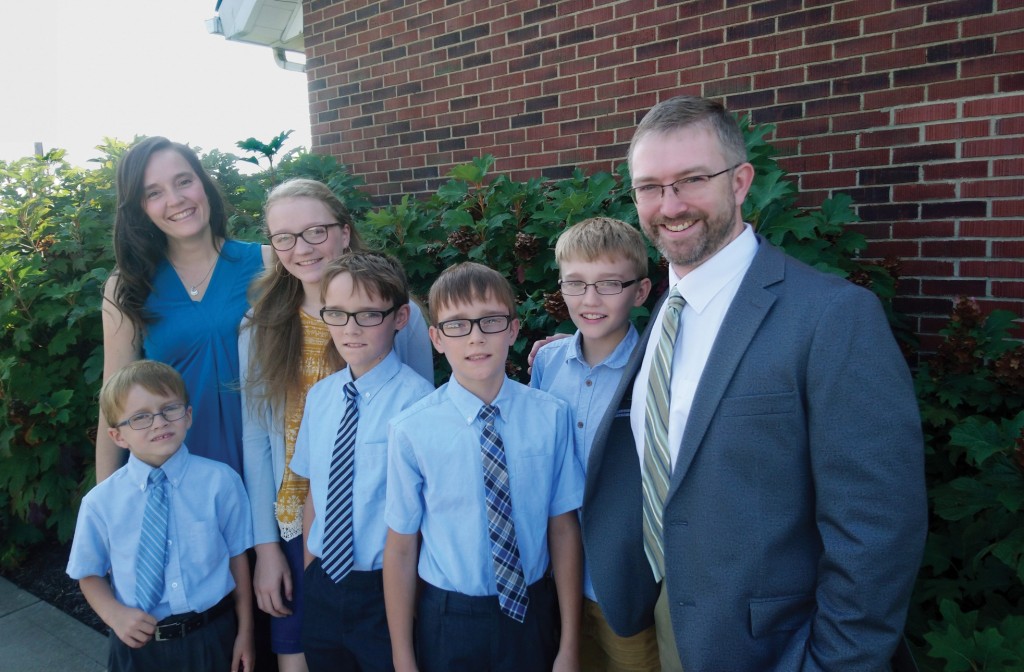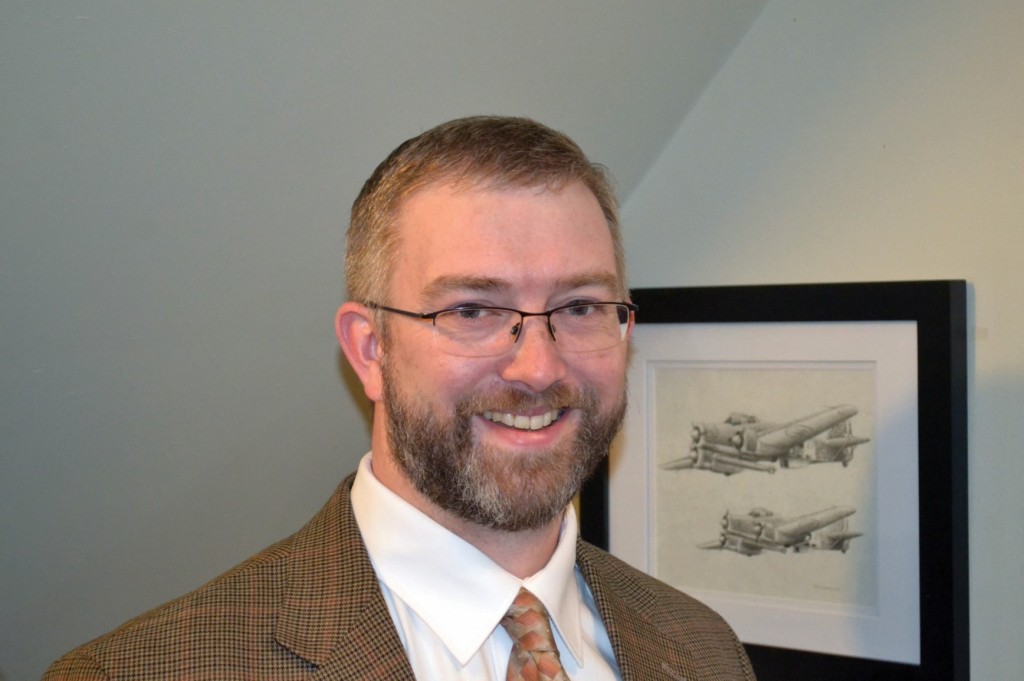You have free articles remaining this month.
Subscribe to the RP Witness for full access to new articles and the complete archives.
“I do not like history. It is boring. Yet I just listened to three hours of lecture, and not once did I wonder when the class would end.” —Al Wissner
Al Wissner records most of the lectures for online use at the Reformed Presbyterian Theological Seminary (RPTS) in Pittsburgh, Pa., and here he was speaking of Dr. David Whitla’s first official lecture at the seminary on patristics and medieval history. Elected by the Synod, Dr. Whitla began his formal ministry as professor of church history on July 1.
His journey to become a professor follows a seemingly meandering, disconnected timeline, but—much like the topic that he cherishes and spends his time teaching—it is one providentially guided.
Family and Education
Born in Dunoon, Scotland, a small peninsular town west of Glasgow, David is the third of four children. He spent his youth in Northern Ireland where his father was a minister. He majored in modern history and French at Queens University in Belfast. From there he was assigned to teach English in France. He then studied education at the University of Ulster in Coleraine. It was at Trinity Reformed Presbyterian Church outside of Belfast that David was mentored by Edward (Ted) Donnelly. The Lord would use a conference on Covenanter church history, organized by Pastor Andrew Quigley, to help history come alive for David and to direct his life in several ways. At this conference he would meet his future wife, June, whom he would marry in 2002.
The Whitla family now includes Katheryn (15), Ethan (12), twins Calvin and Owen (10), and Cameron (6). In his free time, David enjoys reading biographies, studying aviation history (a hobby that all his boys enjoy as well, including fine scale modeling), drawing, and traveling.
Ministry
David came to the United States, where encounters with Gordon Keddie, Roy Blackwood, and Jerry O’Neill soon impacted his life. Rev. Blackwood had arranged a series of job interviews for him, including at Covenant Christian High School in Indianapolis, Ind., where someone was needed with a background in history and French! The Lord continued to open doors. His mentors encouraged him to consider pastoral ministry. At first, external calls were much stronger than the internal call that David sensed—Dr. O’Neill, as he so often does, had a “plan for David’s life.” Heeding the nudging of his mentors, he enrolled at RPTS and grew to have a passion for and love of church ministry. At the feet of his pastor-professors, he learned to integrate systematic theology, Bible classes, church history, languages, preaching, and practical ministry, further equipping him for the shepherding of the Lord’s people.
After earning a master of divinity, David served six years at Southside RP Church in Indianapolis, Ind., alongside Gordon Keddie before becoming senior pastor for two additional years upon Keddie’s retirement. In the midst of excellent ministry, David was not anticipating or seeking a call from the denomination to take up studies in preparation for service at RPTS. He prayerfully sought counsel from many, as he was not excited about leaving the front lines of ministry. Yet, as a student of aviation history, he knew that it took experienced pilots to return to flight school to train new pilots. So, heeding God’s call, he humbly agreed to be available to help prepare the next generation of pastors and church servants.
Along the way, David demonstrated a passion for serving youth, nurtured and sharpened through many years of teaching in the United States, the United Kingdom, and France. He is known by many in the denomination through having served as co-director of Theological Foundations for Youth (TFY) for the past 18 years, where he developed relationships with hundreds of young men and women. He taught in public, private, and homeschool environments and at middle school, high school, college, and masters levels. Through his many years of teaching, David has treasured discipleship as a regular practice.
Doctoral Studies
Dr. Whitla chose to earn a PhD at Queens University in Belfast, Northern Ireland, where he had completed his undergraduate work. Following a model very common in Europe, this program was 100 percent research based. A program like this is incredibly efficient, allowing David to finish quickly while spending time with his extended family and building links between sister RP churches.
“I am so privileged,” said David, “to have been given the opportunity to pursue a doctorate full time, in a field of importance to the church, and in the land of my youth.” Generous grants from the Graduate Studies Committee of the RPCNA and many individual donors made his study financially possible. He continues, “I am humbled and grateful that God’s people should sustain me through their prayers and material generosity.”
His studies went well but included a hectic last few months as his family learned that June’s visa was expiring before their original plans would come to fruition. This resulted in a hurried time of finding a home in Pittsburgh and moving a family of seven from the U.K. to the U.S., all while finishing and defending his doctoral work. The Lord faithfully laid a path forward, and the family arrived in Pittsburgh, exhausted but ready for a new season of life and ministry.
The topic of Dr. Whitla’s work was “Archibald Johnston of Wariston: the Formation of a British Puritan (1611–38).” He notes that Wariston is one of the most neglected figures in our denomination’s history, yet one of the most influential. He was co-author of the National Covenant and Solemn League and Covenant, and study of his work provides a better understanding of the distinctive testimony of the Covenanters. Wariston was an unparalleled diarist, leaving incredible details of his spiritual life. David chose to focus on British Puritanism as it reflects Wariston’s vision of Scottish Presbyterians and English Puritans covenanting with Jesus Christ and each other to see their nation transformed.
New professors often see great challenges in their first year. Each week is a blank canvas eagerly awaiting the application of theological and historical paint, creating a beautiful painting that reflects the true character of God. For David, all of this is accomplished while finding the balance of teaching responsibilities and time with June and the kids.
Yet to Come
One might wonder how the study of church history is relevant in the ministry of the church today. It is the goal of church historians to explain, interpret, and apply the narrative of Christ building His global church over the past two millennia and discern their own place and role in this ongoing story. “More specifically,” says Whitla, “the church history professor should do more than simply ‘tell the story’; he should train students to use the tools of historical research to find, collate, discerningly select, and appropriately use a variety of source materials and apply them in meaningful ways to the life of the church.” It is vital that a Christian historian speak the truth about the past in love, avoiding the extremes of being hyper-critical or overlooking blatant flaws.
Rev. Whitla notes, “The personal spiritual development of a student is aided, because the history of the church confronts the contemporary believer with the wisdom of the ages, by both positive and negative examples. The pastor who possesses even a general grasp of former generations’ hard-won victories, theological insights, and regrettable failures will have the historical ballast he needs to avoid the modern tendency to ‘chronological snobbery’ and cultivate humility as he pursues his own ministry in conversation with the past and with an eye to the future.”
A common question is how the layperson might better understand and apply the lessons of church history. David would suggest a literary diet of biographies and books that provide an overview of church history. Find a part of history that gets your interest and read a biography of a person from that time period. From there, one can build upon one’s excitement and learn more. History need not be boring; it just frequently is not taught well. He recommends several overview history books, including Bruce Shelley’s Church History in Plain Language, B. K. Kuiper’s The Church in History, and N. R. Needham’s 2000 Years of Christ’s Power (this is a series through several ages of church history).
Dr. Whitla is passionate about the RPCNA’s past. With the denomination’s demographics changing, it is important for new members and new generations to learn of the RPCNA’s history in a balanced way. An important aspect of this can be found in the archives of the denomination in Pittsburgh, where a supply of important documents and materials are largely untouched and unexplored. It is valuable to see how former generations of Reformed Presbyterians might helpfully speak again to the present-day issues through the republication of select articles, tracts, books, etc. Such projects might even form the basis for an independent history study by RPTS students. David, a member of the Synod’s Church History Committee, anticipates getting his hands dirty in the archives as he brings to life the work of past generations. He has personally collected many digital copies of 17th Century manuscripts from various archives in the UK, including an unpublished defense of exclusive psalmody and unpublished sermons by Covenanters, such as Robert Blair and William Guthrie.
Being part of the broader academic conversation, Whitla envisions more work on journal articles, the publication of his doctoral work, and lay-level works on the forerunners of faith, both within and outside the Reformed Presbyterian family. John Inglis, a 19th Century Scottish RP missionary to the New Hebrides, has been a focus of such study for David.
David’s prayers for his students include “avoiding the error of exalting tradition above the Scriptures and interpreting texts in novel ways to suit their own culture and historical contexts,” along with the error of idolizing historical commentators. “Part of my work,” says Whitla, “is to help a future generation of pastors interpret the past, making wise application from the past to the present.”
“It is a rich privilege to serve as an undershepherd of Christ, especially as a herald of the gospel,” comments Whitla. “I continue to be deeply conscious of my continued need to grow further in the grace and knowledge of Christ (2 Peter 3:18), and I record with gratitude that the credit for any good that has and may come from my ministry belongs to the Lord. I hope that my experiences in ministry might prove valuable in my work as a seminary professor not only within but outside of class, as students come with the expectation to ‘Study Under Pastors.’ ”
Mark Sampson | chief administrative officer and director of institutional advancement at the Reformed Presbyterian Theological Seminary

